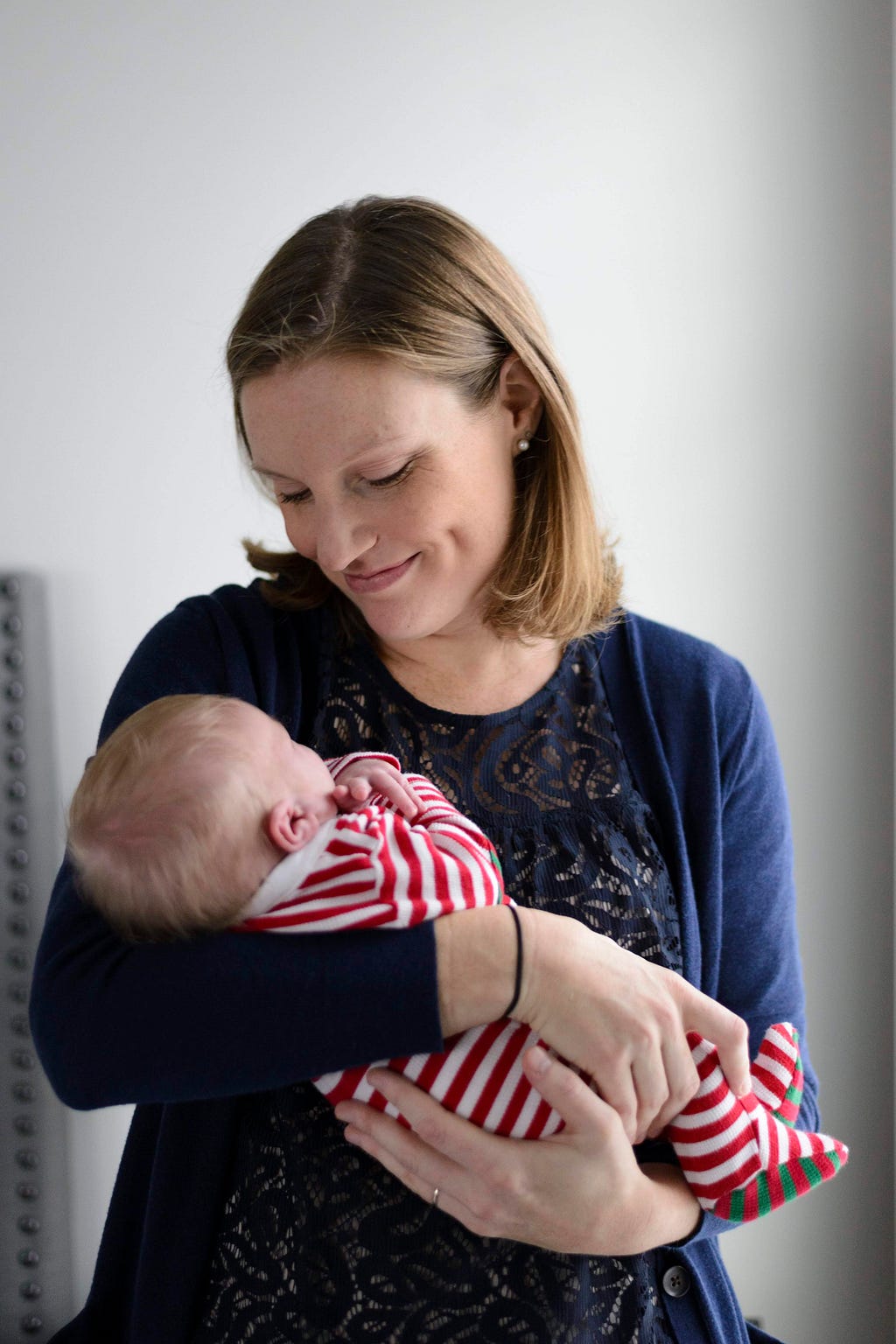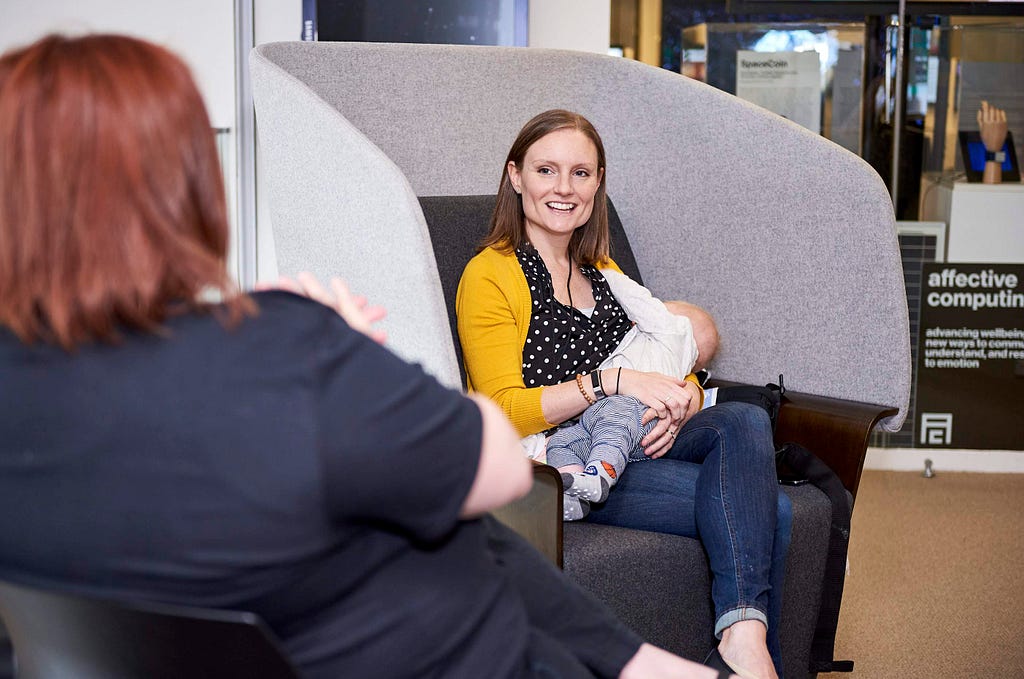“We’re not emphasizing to mothers that they’ve gone through and are going through massive physical, mental, and emotional changes, just as their babies are” with Amanda Norris Ames and Fotis Georgiadis

We treat postpartum anxiety and depression as niche, despite the fact that Postpartum Support International estimates that at least 1 in 7 moms experience some form of these conditions, and far more experience high levels of stress and overwhelm. But while babies are measured and tracked at frequent doctor visits, women visit the doctor once (if at all), on average, postpartum. We’re not emphasizing to mothers that they’ve gone through and are going through massive physical, mental, and emotional changes, just as their babies are. So mothers are oftentimes left feeling alone and afraid to talk about feelings fear of being seen as a bad mother.
I had the pleasure to interview Amanda Norris Ames, founder of Motherful, an app which helps mothers bring peace and presence into busy daily routines. Motherful can be completed on the go and incorporates gratitude journaling, brief guided meditations, and daily mantras, in about 5 minutes a day. Amanda lives with her husband and two children in Charlottesville, Virginia.
Thank you so much for joining us! Can you tell us the “backstory” about what brought you to this specific career path?
I found myself overwhelmed as a new working mom, and I realized this was a common feeling. I recognized that mothers — who best understand the all-consuming experience of new motherhood — need to be designing and advocating on behalf of moms. I wanted to see more moms doing so in a realistic way, rather than presenting motherhood only through a curated social media lens. But I also understood the difficulty in finding the time to advocate for mothers when you’re in the thick of new parenthood yourself. I decided to devote some time and leverage my networks to develop creative solutions for supporting mothers’ wellness, which eventually led to my creation of Motherful, a mindfulness tool for moms.
According to Mental Health America’s report, over 44 million Americans have a mental health condition. Yet there’s still a stigma about mental illness. Can you share a few reasons you think this is so?
I definitely see this in my area of work. We treat postpartum anxiety and depression as niche, despite the fact that Postpartum Support International estimates that at least 1 in 7 moms experience some form of these conditions, and far more experience high levels of stress and overwhelm. But while babies are measured and tracked at frequent doctor visits, women visit the doctor once (if at all), on average, postpartum. We’re not emphasizing to mothers that they’ve gone through and are going through massive physical, mental, and emotional changes, just as their babies are. So mothers are oftentimes left feeling alone and afraid to talk about feelings fear of being seen as a bad mother.

Can you tell our readers about how you are helping to de-stigmatize the focus on mental wellness?
I’m working to empower other moms to prioritize their own mental wellbeing, seek out help when they need it, and more openly celebrate both the joys and difficulties of motherhood. We’ll begin to break through the stigma when we start to talk about postpartum mental health issues as extremely common and extremely treatable, whether though therapy, medication, mindful practices, or other methods. I also hope to normalize the different ways we approach self-care. We tell ourselves that we’ll find relaxation after the baby sleeps through the night or starts preschool. But I hope to help moms see that small steps towards self-care now can have a significant impact on wellbeing. We might not have the time to meditate for 30 minutes a day, but 5 minutes of deep breathing is better than nothing.
Was there a story behind why you decided to launch this initiative?
I found myself anxious and overwhelmed as a new mom after the births of both of my children. I had a serious lack of balance, so I began trying different evidence-based stress-reduction methods. Based on the positive outcomes for both moms and babies when mothers incorporate mindfulness-based practices, I knew I had to give meditation a shot. But many of the mindfulness apps I tried just didn’t seem to understand new motherhood — they suggested you meditate for 10 minutes or more at a time while in a quiet, comfortable area. I had a constantly-breastfeeding baby and an energetic toddler — there were no 10-minute long, quiet stretches in my day. With the abundance of mindfulness apps on the market, I was shocked that I couldn’t find a meditation app made for moms, and so I set out to make one myself. I created Motherful, a simple mindfulness tool for moms that incorporates gratitude journaling, short guided meditations, and daily mantras, all in about 5 minutes a day.
In your experience, what should a) individuals b) society, and c) the government do to better support people suffering from mental illness?
We talk about the fact that women are now able to pursue a wide range of career and motherhood options, but we don’t talk about the fact that mothers are oftentimes pursuing these options with little to no community or government support. In the U.S., women frequently receive a short or unpaid maternity leave, if they receive one at all. There’s no guarantee that they will receive proper medical care for birth injuries. They’re encouraged to breastfeed, which for working moms largely means pumping. These are just a few of the challenges new moms face. So in addition to educating new moms on the prevalence and treatment of maternal mental health issues, as I discussed earlier, I think we have to address the structural issues that place significant burdens on new moms. I believe that advocating for more mom, baby, and family friendly policies in the U.S. (whether in healthcare, child care, or family leave policies) would go a long way in supporting moms struggling with mental health challenges.

What are your 6 strategies you use to promote your own wellbeing and mental wellness? Can you please give a story or example for each?
- Gratitude journaling. More than any other activity, intentionally incorporating a gratitude practice into my daily routine has been a game changer. I rarely spend more than a minute a day on it, but it has truly improved my daily mindset.
- Meditation. I try to meditate, whether through listening to a short, guided meditation or simply committing to sitting for a series of calming breaths, each day.
- Physical activity. Fitting in a workout is hard with two small children, but I find I feel better on the days that I can squeeze in even 15 minutes of cycling, running, or yoga.
- Reading. I love reading inspiring stories, blogs, and memoirs from strong female writers.
- Positive media. I’m not anti-social media, though I know that eliminating it does significantly benefit some. But lately I’ve been trying to follow accounts that empower, inspire, and educate.
- Peer support. I regularly text with two other mothers of young children who I know will have a non-judgmental listening ear.
What are your favorite books, podcasts, or resources that inspire you to be a mental health champion?
So many resources try to put moms in neat little boxes — breastfeeding vs. bottle feeding, working vs. stay at home, etc. — but the reality for most of us is that it’s much more complex. I appreciate moms who share their stories, their struggles, and their strategies, both because I’m all for finding creative mom hacks and because these stories show the world that there’s not one right way to do this motherhood thing. I believe resources that embrace the full range of motherhood experiences — including maternal mental health issues — empower moms to trust their gut, find solutions that work for their families, and get help when they need it.
Some of the resources I’ve recently enjoyed that openly share these motherhood stories include:
The Longest Shortest Time podcast
Mindful Return blog, book, and online course by Lori Mihalich-Levin
Slay Like a Mother by Katherine Wintsch
The Fifth Trimester: The Working Mom’s Guide to Style, Sanity, and Success After Baby by Lauren Smith Brody
Any memoirs by strong, honest mothers (recent examples include: Michelle Obama, Brene Brown, Kelly Corrigan, Glennon Doyle and Shauna Niequist)
Thank you so much for these insights! This was so inspiring!
“We’re not emphasizing to mothers that they’ve gone through and are going through massive physical… was originally published in Authority Magazine on Medium, where people are continuing the conversation by highlighting and responding to this story.



